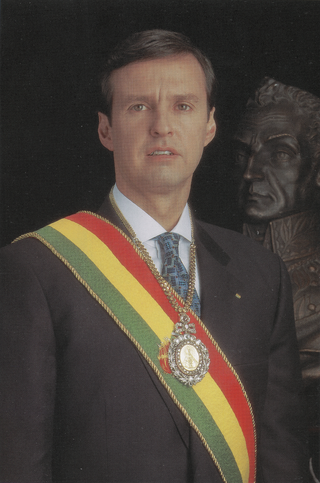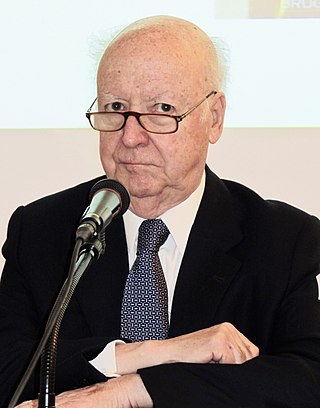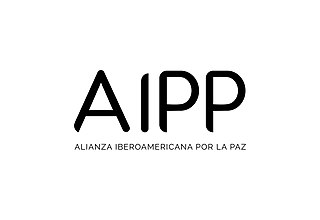
Jorge Fernando Arturo "Tuto" Quiroga Ramírez is a Bolivian politician and industrial engineer who served as the 62nd president of Bolivia from 2001 to 2002. A former member of Nationalist Democratic Action, he previously served as the 36th vice president of Bolivia from 1997 to 2001 under Hugo Banzer and as minister of finance under Jaime Paz Zamora in 1992. During the interim government of Jeanine Áñez, he was briefly appointed from 2019 to 2020 as the country's international spokesperson to denounce alleged human rights violations by the previous government.

Ibero-America or Iberian America is generally considered to be the region in the Americas comprising countries or territories where Spanish or Portuguese are predominant languages. Spain and Portugal are themselves sometimes included in some Ibero-American diplomatic circles, such as the Ibero-American Summit and the Organization of Ibero-American States. The Organization of Ibero-American States also includes Spanish-speaking Equatorial Guinea, in Central Africa, but not the Portuguese-speaking African countries. The Latin Recording Academy, the organization responsible for the Latin Grammy Awards, also includes Spain and Portugal as well as the Latino population of Canada and the United States in their definition of Ibero-America.

The Organization of Ibero-American States, formally the Organization of Ibero-American States for Education, Science and Culture, is an international organization made up of 23 members states of Iberophone nations in Europe and the Americas, as well as one member in Africa. The OEI's membership is composed of all of the sovereign states of Ibero-America and the Iberian Peninsula, as well as Equatorial Guinea. All members are Portuguese and Spanish speaking nations, in addition to Andorra, which is predominantly Catalan speaking, though the organization does not include all the Iberophone nations of the world.

Jorge Edwards Valdés was a Chilean novelist, journalist and diplomat. He was the Chilean ambassador to France during the first Sebastián Piñera presidency.

The FAES is a Spanish think tank. It is a non-profit liberal-conservative organisation with strong links to the People's Party (PP); it is even known informally as the "People's Party think-tank". Its headquarters are in Madrid. Each year, the FAES publishes a Report on Activities, which can be downloaded from its website.
Diario de América is a Spanish-language opinion journal about politics, economics, culture and social issues, published in the United States.

Trofeo EFE is an annual football award given by the EFE news agency since the 1990–91 season to the best Latin-American player in Spanish football. Recipients are selected based on assessments from the agency's sports editors.
The Ibero-American Summit, formally the Ibero-American Conference of Heads of State and Governments, is a yearly meeting of the heads of government and state of the Spanish- and Portuguese-speaking nations of Europe and the Americas, as members of the Organization of Ibero-American States. The permanent secretariat in preparation of the summits is the Ibero-American General Secretariat (SEGIB).
The Redalyc project is a bibliographic database and a digital library of Open Access journals, supported by the Universidad Autónoma del Estado de México with the help of numerous other higher education institutions and information systems.
The École Supérieure Internationale de Bruxelles (ÉSIB), is a private European institution of higher education, and an educational branch of the Fundación Dharma. It was constituted by Royal Decree 6/CH/15.372, published in the Moniteur Belge 13/09/06. ÉSIB offers educational courses leading to Certificates, Diplomas and Degrees up to Doctorate levels like a university affiliated with the University of Panama International University-Universidad Internacional Euroamericana (UIE).

The Ibero-American Championships in Athletics is a biennial athletics competition for athletes representing Ibero-American countries as well as a number of other Spanish- or Portuguese-speaking countries in Africa. The competition is organised by the Asociación Iberoamericana de Atletismo.

The 1983 Ibero-American Championships was an athletics competition which was held at the Estadi Serrahima in Barcelona, Catalonia, Spain from 23 to 25 September 1983. A total of 37 events were contested, of which 22 by male and 15 by female athletes. It was the first edition of the Ibero-American Championships, although a precursor to the tournament, the Juegos Iberoamericanos, had been held in 1960 and 1962. Eighteen countries participated, drawing from the 22 members of the Asociación Ibero-Americano de Atletismo.

The 1986 Ibero-American Championships was an athletics competition which was held at the Estadio Pedro Marrero in Havana, Cuba from 27 to 28 September 1986. A total of 36 events, comprising 21 men's and 15 women's events, were contested by sixteen countries. It was the second edition of the Ibero-American Championships, and the first to be held in Latin America. The Chilean city of Valparaíso was initially chosen to host the event, but the competition was moved after organisation difficulties. High temperatures at the venue affected athletic performances, particularly in the longer distance events.
Premio Iberoamericano Planeta-Casa de América de Narrativa was a Latin American Spanish language literary award. The winner received US$200,000 making it one of the richest literary prizes in the world. Beyond the large endowment, the award was also notable for the large number of books which were judged; in 2010 over 600 books entered the award, far surpassing the approximately 120 books which entered the Man Booker Prize, for example.

The 2012 Ibero-American Championships in Athletics was the fifteenth edition of the international athletics competition between Ibero-American nations. It was held at the Polideportivo Máximo Viloria in Barquisimeto, Venezuela between 8–10 June. Twenty-five nations and a total of 398 athletes participated at the competition.

The Asociación Iberoamericana de Atletismo is the governing body for the sport of athletics of European, Latinamerican, and African countries with iberian origin and/or Spanish or Portuguese language. Current president is Oscar Fernández Cáceres from Peru.
José Luis Gómez Martínez is a professor emeritus of Spanish at the University of Georgia. Essayist and literary critic, his research into the theory of the essay, along with his work on Hispanic thought and Latin American fiction helped push literary boundaries and open up new lines of thinking within and outside of academia. During his professional career José Luis Gómez won several awards for his scholarly contributions, including the prestigious Guggenheim Memorial Foundation Fellowship (1984–1985), the Albert Christ-Janer Award (1988), named Professor of the Year by the AATSP-GA, the 1989 Sturgis Leavitt Prize. In 2000 he was elected Membro Correspondente da Academia Brasileira de Filosofia.
The OTI Festival 1972 was the very first edition of the annual OTI Festival and was held in Madrid, Spain. Organised by the Organización de Televisión Iberoamericana (OTI) and host broadcaster Televisión Española (TVE), the contest was held at the auditorium of the Palacio de Exposiciones y Congresos on Saturday 25 November 1972 and was hosted by Rosa María Mateo and Raúl Matas.
Asociación de Estados Iberoamericanos para el Desarrollo de las Bibliotecas Nacionales de Iberoamérica is an association of Ibero-American national libraries. It began in Mexico on 14 December 1989 as the Asociación de Bibliotecas Nacionales de Iberoamérica. In 1999 the group adopted its current name. As of 2019 it operates from headquarters in Caracas, Venezuela. Official languages of the group are Spanish and Portuguese.

The Ibero-American Alliance for Peace (Spanish: Alianza Iberoamericana por la Paz) is an international non-governmental organization working to promote peacebuilding, human rights and disarmament in the Ibero-American region. Co-founded in 2016 by Angelo Cardona and Maria Teresa Barrios in Berlin during the world congress 'Disarm for a Climate of Peace' of the International Peace Bureau. Initially the coalition was the International Peace Bureau Youth Network (IPBYN) for the region of Latin America known under the name of Latin American Youth Network for Peace'









